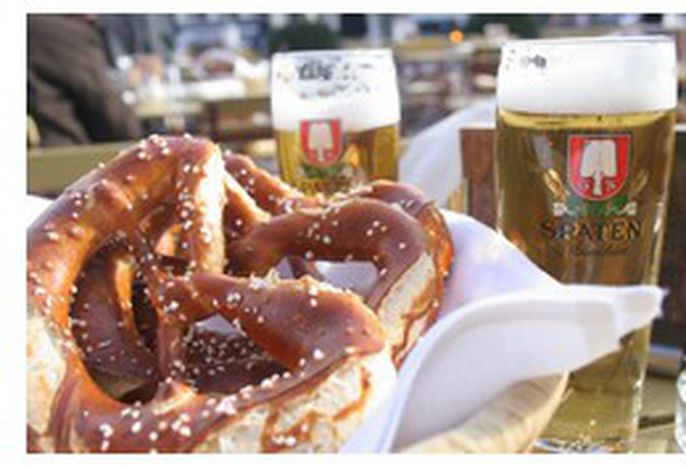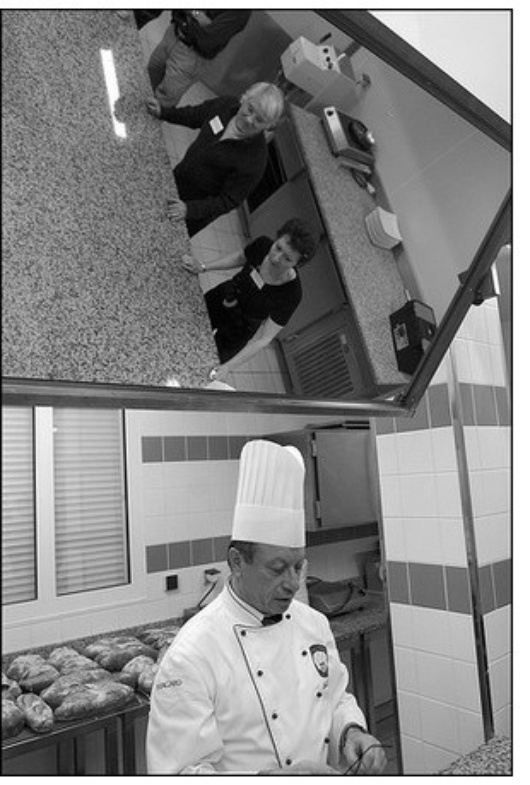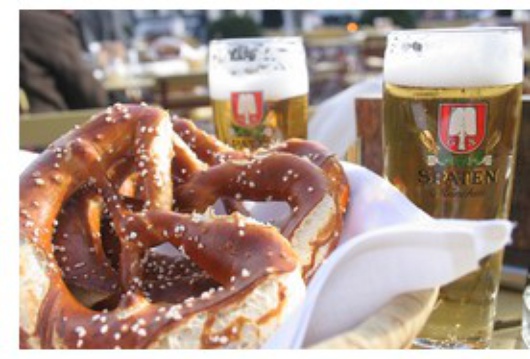
Do the French top German cuisine?
Published on
Translation by:
Andrew PritchardMajor names in the cookery world have backed France’s application to UNESCO to have its cuisine listed as a world heritage item. In multicultural Germany, the idea is stirring up mixed reactions

Little Istanbul from Berlin (Photo: Léa Chalmont)
The Orientrasse in Kreuzberg, Berlin's 'Little Istanbul'. Here everybody unwinds from a hard days labour or goes for a saunter with a doner kebab. It’s a sandwich which has the sweet smells of the Orient in pitta bread, with small strips of grilled meat, salad and raita sauce which can be devoured on the move. Made in Germany cuisine caters for many tastes - be it German or Turkish, Thai or Italian, Berliner or Munich. But is this gastronomy in the eyes of the French?
On 23 February, French president Nicolas Sarkozy announced his intention to have a UNESCO world heritage listing for French gastronomy. 'Like all art, cuisine must develop, which is why I’m sceptical about the continuity and viability of a title like that,' he reportedly said.
Michael Hoffmann from Frankfurt heads the Michelin star Margaux restaurant in Berlin. He doesn’t mince his words: 'My meal was made up of three dishes and you were able to swap with other people. Dining is a fundamental part of life which allows us to gain a greater understanding of other people. Nowadays we get it over and done with as quickly as possible. How is this going to ensure a UNESCO heritage listing?'
From practical to artistic cooking
 The German word esskultur ('food culture') translates to the word 'gastronomy' in French. The differing senses of the word sum up France and Germany’s contrasting attitudes towards cuisine. In Germany, eating has long been seen as a function rather than a ‘pleasure’. The word ‘gastronomy’, proudly used by the French, transforms the act of cooking into an art. So what do the German’s think of Sarkozy’s ambitious ploy?
The German word esskultur ('food culture') translates to the word 'gastronomy' in French. The differing senses of the word sum up France and Germany’s contrasting attitudes towards cuisine. In Germany, eating has long been seen as a function rather than a ‘pleasure’. The word ‘gastronomy’, proudly used by the French, transforms the act of cooking into an art. So what do the German’s think of Sarkozy’s ambitious ploy?
Michael Hoffmann is not alone in doubting the idea. Jean Kline, linguist and author of a Franco-German cookery publication which looks into and compares cultural trends on both sides of the Rhine, is also annoyed by the request. 'The idea of masterpieces of the intangible heritage of humanity should be limited to the traditions which fall into the ‘long-standing customs’ bracket. Where will French cuisine be in a century from now? Nobody knows.'
According to the UNESCO convention, 'intangible heritage' can be 'social practices, rituals and festivals, learnings and practices to do with nature, and know-how of traditional crafts.' So does the existing tradition of gastronomy fall into this category? Yes and no, according to Michael Hoffmann. 'We must be careful. Whereas the historical monument has fixed value, cuisine is just know-how which is passed on. But how will this passing on be carried out?'
As much about gastronomy as it is regions
French gastronomy benefits from worldwide notoriety but is it justified? And how will this change if it’s added to the UNESCO’s heritage list? Susan Weiner, Berlin’s star cook according to French survey company Mediametrie records questions this. 'Adding gastronomy to the world heritage list seems initially like a good idea, but on what grounds should French cuisine be considered above others?' Austrian by birth, this talented chef can’t help but wonder 'that French cuisine, like Austrian, is comprised from so many different places that it must primarily be distinguished before it’s crowned.'
 While the German-speakers philosophise, the Italians dispute: the European Union actually recognises 166 Italian specialities in comparison to France’s 156. Monica Tenderini is an Italian chef at Café Marx in the popular Kreuzberg district Berlin. In a more measured fashion, she struggles to understand the motives for such a venture - 'cooking above all is about culture and not competition. Furthermore, it could be dangerous to try and objectify something which is hypothetical, the intangible - especially when questions about a chapter in history are raised.' For Michael Hoffmann, the Germans are a special case when it comes to food culture: 'the second world war destroyed everything. Not just our customs but gastronomy as well! The Germans have a lack of culinary aplomb, caused by a lack of self-confidence. German culture was relegated to the background in favour of cultures of the occupying forces.'
While the German-speakers philosophise, the Italians dispute: the European Union actually recognises 166 Italian specialities in comparison to France’s 156. Monica Tenderini is an Italian chef at Café Marx in the popular Kreuzberg district Berlin. In a more measured fashion, she struggles to understand the motives for such a venture - 'cooking above all is about culture and not competition. Furthermore, it could be dangerous to try and objectify something which is hypothetical, the intangible - especially when questions about a chapter in history are raised.' For Michael Hoffmann, the Germans are a special case when it comes to food culture: 'the second world war destroyed everything. Not just our customs but gastronomy as well! The Germans have a lack of culinary aplomb, caused by a lack of self-confidence. German culture was relegated to the background in favour of cultures of the occupying forces.'
Proving, before 2009, that culinary art is passed down from generation to generation, and that it integrates with nature and history, is the challenge ahead for French cuisine if it is to achieve consecration. In the meantime, it’s blue ribbons, and as Rabelais once wrote 'may the bad times pass by, and the good return, while we toast our glasses around rich ham.'
Photos: homepage (...antonio.../ Flickr), Little Istanbul (Léa Chalmont), chef Michel Bazin (Alain Bachelier/ Flickr), Munich (lea Reynolds/ Flickr)
Translated from Gastronomie : la France inscrite à l’Unesco ?



